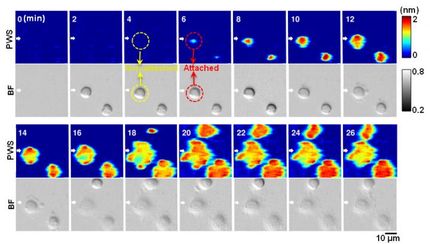Tracking protein’s role in stem cell function
MCL-1 is a member of the BCL-2 family of proteins important for blocking apoptosis, or programmed cell death. Many types of cancer cells escape the body’s effort to kill them by overexpressing MCL-1.
However, new evidence from Vanderbilt University researchers indicates that MCL-1 also helps maintain the identity and ability of stem cells to differentiate, or give rise to other kinds of cells. This capacity of stem cells to become any cell in the body is called pluripotency.
The researchers found that a form of MCL-1 maintains stem cell pluripotency through its role in the inner matrix of mitochondria, the cell’s energy producing “power plants.” When this MCL-1 is depleted by an inhibitor, stem cells differentiate.
MCL-1 depletion also changes the shape of mitochondria, which are very dynamic organelles, said the paper’s corresponding author, Vivian Gama, PhD, assistant professor of Cell and Developmental Biology in the School of Medicine.
Mitochondria undergo fusion and fission — merging together and breaking apart — depending upon the state of the cell and cell type. Stem cell mitochondria are more fragmented, but when cells differentiate, their mitochondria fuse together and become more elongated to support higher demands for energy.
When MCL-1 is depleted in stem cells, their mitochondria fuse, indicating that MCL-1 expression is important for maintaining the normal fragmented state of stem cell mitochondria.
Because the proteins that control mitochondrial fusion and fission and the metabolic machinery are all located at the mitochondria, there is potential cross-talk across all of these pathways, Gama said.
Independent studies in the Gama lab are directed toward glioblastoma, an often-deadly form of brain cancer. “We would like to learn whether these newly described functions of the BCL-2 family in mitochondrial dynamics can also modulate the survival of cancer stem-like cells,” she said.
“These are cells in the tumor that are capable of propagating the tumor,” Gama explained. “If by blocking MCL-1, you can induce them to differentiate, this would be another way to stop them from dividing.”
Original publication
Most read news
Original publication
Megan L. Rasmussen, Leigh A. Kline, Kyungho P. Park, Natalya A. Ortolano, Alejandra I. Romero-Morales, Christin C. Anthony, Kathryn E. Beckermann, Vivian Gama; "A Non-apoptotic Function of MCL-1 in Promoting Pluripotency and Modulating Mitochondrial Dynamics in Stem Cells"; Stem Cell Reports; 2018
Topics
Organizations
Other news from the department science
These products might interest you

Kjel- / Dist Line by Büchi
Kjel- and Dist Line - steam distillation and Kjeldahl applications
Maximum accuracy and performance for your steam distillation and Kjeldahl applications

AZURA Purifier + LH 2.1 by KNAUER
Preparative Liquid Chromatography - New platform for more throughput
Save time and improve reproducibility during purification

Get the analytics and lab tech industry in your inbox
By submitting this form you agree that LUMITOS AG will send you the newsletter(s) selected above by email. Your data will not be passed on to third parties. Your data will be stored and processed in accordance with our data protection regulations. LUMITOS may contact you by email for the purpose of advertising or market and opinion surveys. You can revoke your consent at any time without giving reasons to LUMITOS AG, Ernst-Augustin-Str. 2, 12489 Berlin, Germany or by e-mail at revoke@lumitos.com with effect for the future. In addition, each email contains a link to unsubscribe from the corresponding newsletter.


























































